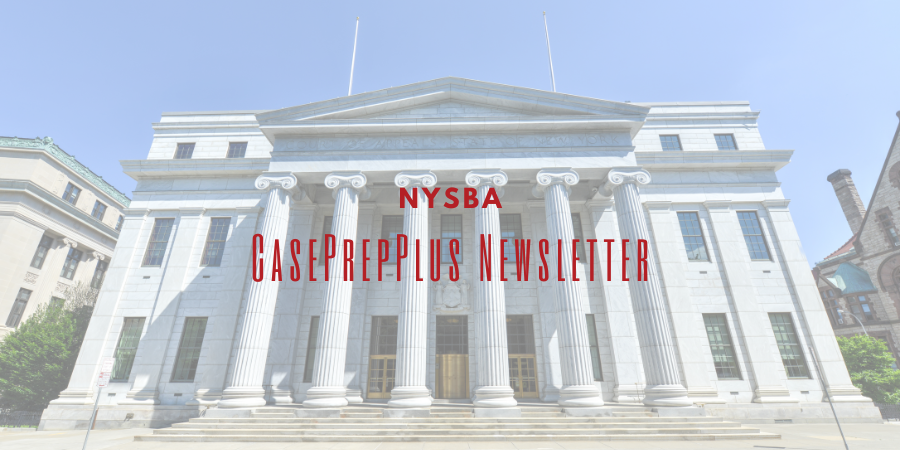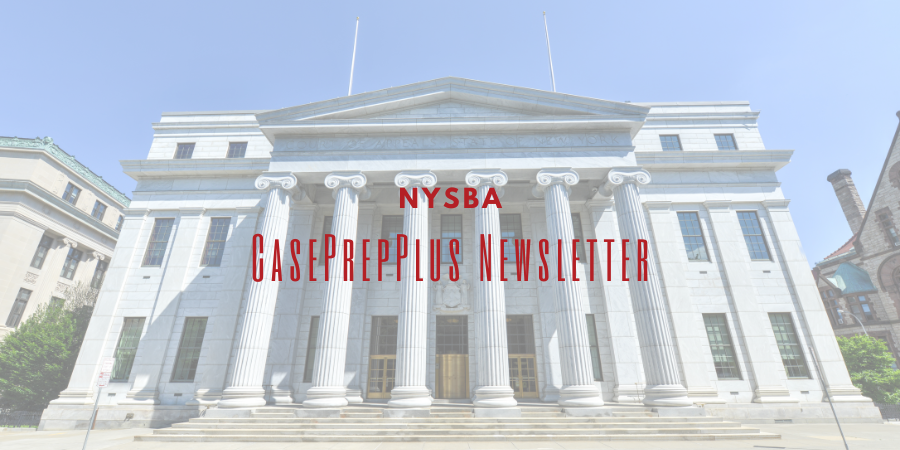
NYSBA CasePrepPlus Newsletter
Here’s what has been happening in New York’s appellate courts over the past week.
Appellate Division, First Department
Southern Advanced Materials, LLC v Abrams, 2023 NY Slip Op 04704 (1st Dept Sept. 21, 2023)
Corporate Law, Contracts
Issue: May the acquisition of a limited liability company, which was structured as a sale of 100 percent of the membership interests in the target company, be characterized as a dissolution of the company under the terms of its operating agreement, which would entitle a former preferred shareholder to a preferred return upon dissolution?
Facts: The plaintiff was a holder of Class C Preferred Interests in CV Holdings, LLC (CVH). The CVH operating agreement provided that, in the event of a dissolution, the holders of preferred interests were entitled to “a 10 percent preferred return if the amount that would otherwise have been distributed to the preferred shareholder would have provided an annual return of less than 30 percent upon that shareholder’s preferred investment.” In the event of a sale to a third party, however, “all shareholders would be compensated based on their respective pro rata interests in the company, without any premium for the preferred shareholders.” In 2014, all shareholders in CVH, including the plaintiff, agreed to sell all of the company’s equity to a third party. After the plaintiff objected to the terms of the proposed agreement, to obtain the plaintiff’s consent to close, the majority shareholder negotiated with the plaintiff a separate Retained Claims Agreement, which gave the plaintiff three options to resolve its objections after the closing: (1) the right to obtain the best terms offered to any other minority shareholder, (2) the right to acquire an interest in a company that was not being sold as part of the transaction, or (3) the right to sue over the objections. And, of course, after the closing, the plaintiff chose to sue, arguing that the sale of 100% equity to the third party resulted in the dissolution of CVH under the operating agreement and entitled the plaintiff to a preferred return.
Holding: The First Department held that the CVH operating agreement provided “that a dissolution of CVH occurs only upon ‘the disposition by the Company of substantially all of its assets’ (emphasis added). Apart from the assets transferred to [the majority shareholder] in the Pre-Closing Restructuring, CVH itself did not dispose of any assets when its previous shareholders sold their equity in the company.” The company still retained the same assets before and after all of its equity was sold, and thus it was not dissolved in the transaction. Moreover, the Court noted, the plaintiff’s interpretation of the operating agreement would render the “sale to a third party” provision meaningless. Finally, the Court held, “the question of whether CVH continued to operate after the . . . transaction is irrelevant to the question of whether that transaction itself constituted a dissolution of CVH. After the . . . transaction closed, [the plaintiff] no longer had any interest in CVH as an entity and any postclosing decision made by [the third party] (which is not a party to this action) to reorganize the corporate structure it had purchased would have had no effect on [the plaintiff’s] rights or interests. Whether or not [the plaintiff] is entitled to a preferred return under section 13.3 of the Operating Agreement depends entirely on whether a dissolution of CVH occurred while [the plaintiff] was still a shareholder of CVH, which it ceased to be upon the closing of the . . . transaction.”
Corporate Law, Torts
Issue: May a plaintiff maintain a successor liability tort claim against a corporation that purchases the assets of another corporation under the mere continuation theory exception to the general rule that a purchasing corporation which acquires the assets of another is not liable for the torts of the selling corporation, where the purchasing corporation does not actually retain any of the selling corporation’s assets?
Facts: After obtaining a judgment on a lease guaranty against BridgeStreet Worldwide, the plaintiff sued Versa, a private equity investment advisor, and Domus Funding, a Versa-managed special purpose entity, even though they were not signatories to the lease guaranty, on the theory that they were successors to and alter egos of BridgeStreet. Domus Funding had purchased a syndicated loan made to BridgeStreet and then foreclosed on the loan when BridgeStreet was unable to pay. In the consensual foreclosure, BridgeStreet’s assets were transferred to entities other than Versa or Domus Funding, and BridgeStreet was dissolved on the day after the foreclosure. After Versa and Domus Funding moved to dismiss based on documentary evidence, and the plaintiff cross-moved for summary judgment, the trial court denied both motions, holding that although the plaintiff made a “prima facie” showing that the defendants completely absorbed BridgeStreet’s business operations, issues of fact precluded summary judgment at that early stage. Following discovery, the parties again cross moved for summary judgment, and the trial court granted the plaintiff summary judgment on its mere continuation and alter ego theories, “[g]iven their prior admissions in this case,” and refused to consider the defendants’ documentary evidence showing that neither of them actually acquired BridgeStreet’s assets.
Holding: The First Department held that the trial court erroneously refused to consider the defendants’ documentary evidence and incorrectly believed that the mere continuation theory had already been established as law of the case. As the First Department explained, “[a] denial of a summary judgment motion is not an adjudication on the merits. Therefore, a party is not relieved from proving its later entitlement to summary judgment merely because it previously made out a prima facie case in motion practice” (citation omitted). In the earlier summary judgment order, the Court’s holding that the plaintiff made a prima facie case on successor liability was not a binding finding on the merits that the defendants were actually successor corporations to BridgeStreet. Thus, the trial court should have considered and credited the documentary evidence showing that the defendants did not actually acquire any of BridgeStreet’s assets in the consensual foreclosure and, thus, could not be successor corporations for liability purposes. The First Department also rejected the plaintiff’s alter ego theory because even if the defendants exercised dominion and control over BridgeStreet after the foreclosure, no evidence existed that “defendants committed any wrong or injustice against plaintiff by pursuing a statutorily authorized consensual foreclosure under the facts of this case,” which is a necessary element to establish alter ego liability.
Appellate Division, Second Department
McKay v Town of Southampton, 2023 NY Slip Op 04664 (2d Dept Sept. 20, 2023)
Torts, False Imprisonment, Negligence
Issue: May an individual maintain a false imprisonment and negligence suit for his pretrial detention on criminal charges where he failed to make a Criminal Procedure Law § 180.80 application for release from detention because the District Attorney’s office had consented to his release and subsequently pled guilty to the charges?
Facts: After the plaintiff was arrested and detained in the Suffolk County Correctional Facility, the District Attorney’s office advised his counsel, on June 21, 2019, that his case was not being presented to a grand jury and that the DA’s office was consenting to the plaintiff’s release under CPL 180.80. Although the DA’s office communicated their consent to the plaintiff’s release to the Town Criminal Court, the Town failed to act on it. The plaintiff, who was unaware of the agreement, thus remained confined for an additional 2.5 months after the DA’s office had consented to his release. The plaintiff then filed a false imprisonment and negligence suit against the Town for his unlawful confinement. Supreme Court dismissed the case on the Town’s motion for summary judgment, holding that plaintiff’s confinement was privileged because he never made an application for release pursuant to CPL 180.80, which was mandatory, retroactively consented to his confinement by later pleading guilty to the charges and agreeing to a sentence of “time served.”
Holding: The Second Department held that although the Town demonstrated a prima facie entitlement to judgment by showing that the plaintiff was initially confined lawfully, the plaintiff raised a triable issue of fact on his claims by demonstrating that he remained confined for 2.5 months after the DA’s office consented to and requested his release from pretrial detention. The plaintiff’s failure to make a CPL 180.80 application for release did not defeat his claims, as a matter of law, because he showed that it was “the ‘standard practice in Suffolk County’ that the District Attorney’s Office advises the court to release a detained individual if both sides agree that the conditions for release pursuant to CPL 180.80 have been met, [and thus] an additional application by the plaintiff for his own release may have been rendered unnecessary.” The Second Department also rejected the Town’s theory that the plaintiff’s guilty plea served to retroactively consent to his unlawful confinement because no statute or precedent supported it, and so holding would allow the Town “to detain any individual suspected of a crime, for an indefinite period of time, as long as that individual eventually agreed to plead guilty for a sentence of ‘time served,’” which would be antithetical to the purpose of CPL 180.80. And finally, the Court held, because the trial court did not specify the exact time that constituted the “time served” sentence to which the plaintiff agreed, it could not be determined on summary judgment that the plaintiff had consented to his entire period of confinement or just to the portion that occurred prior to the June 21, 2019 agreement for his release.
Appellate Division, Third Department
Matter of Luisa JJ. v Joseph II., 2023 NY Slip Op 04699 (3d Dept Sept. 21, 2023)
Family Law
Issue: Should a hearing be held under the International Child Abduction Remedies Act, which implements the Hague Convention on the Civil Aspects of International Child Abduction in the United States, before a court orders a child returned to a parent in a foreign country?
Facts: Under a separation agreement, the father and mother agreed that they would have shared custody of the child, with the child living most of the time in Italy with the mother and the remainder of the year with the father in New York. Upon returning to New York in December 2022, the child told the father that he had been sexually abused by another minor who frequently stayed in the mother’s household. The child expressed fear about returning to Italy, where his mother had not done anything to remedy the situation, and the father decided not to return the child when required under the parties’ separation agreement. The mother then commenced a proceeding seeking the child’s return under the Hague Convention, and the father moved to dismiss asserting two exceptions under the Hague Convention— “there is a grave risk that the child’s return would expose him to physical or psychological harm or otherwise place the child in an intolerable situation” and that “the child objects to being returned and has attained an age and degree of maturity at which it is appropriate to take account of his views” (alterations omitted). Without holding a hearing on the father’s exceptions, Supreme Court ordered that the child be returned to the mother’s custody in Italy.
Holding: Although recognizing that the Hague Convention does not require discovery or a hearing before a child is ordered returned to their country of residence, the Third Department held that “courts routinely hold hearings in circumstances such as these. It is also common to conduct an in camera interview, direct and/or consider the results of expert evaluations, and/or appoint and hear from an attorney for the child who is the subject of a return petition” (citations omitted). Thus, even though the mother established that the father had wrongfully retained the child in New York, the trial court abused its discretion in failing to hold a hearing on the father’s Hague Convention exceptions, because the father raised genuine issues of material fact on whether returning the child to Italy where the abuse occurred and had not been remedied was an “intolerable situation” and whether the child was sufficiently mature to credit his objections to returning to the mother’s custody.
Matter of Minichino v Fox, 2023 NY Slip Op 04707 (3d Dept Sept. 21, 2023)
Election Law, Civil Procedure
Issue: When and how must a challenge under Election Law § 16-102 objecting to the certificates of nomination for judicial election candidates be commenced?
Facts: Following an August 13, 2023 judicial nominating convention for judicial candidates running for election to Supreme Court in the Ninth Judicial District, including sitting Second Department Justice Francesca Connolly, the petitioners commenced a proceeding to challenge the certificates of nomination on August 23, 2023, alleging certain improprieties in the voting for the nominations and the subsequent meeting minutes. The respondents argued that the proceeding was barred by the 10-day statute of limitations, because although the petition was filed on the 10th day, it was not served until the 11th day. Following a hearing, Supreme Court agreed and dismissed the challenge to the certificates of nomination.
Holding: The Third Department held that “[t]o properly institute a proceeding raising a challenge under Election Law § 16-102, a petitioner must commence the proceeding and complete service on all the necessary parties within the period prescribed by Election Law § 16-102 (2).” That 10-day statute of limitations period runs from the day that the nominating convention is held, and not from when the resulting certificates of nomination are filed with the Board of Elections. And because the petitioners did not complete service of the petition until after the 10-day period expired, their challenge to the judicial nominations was time barred.

